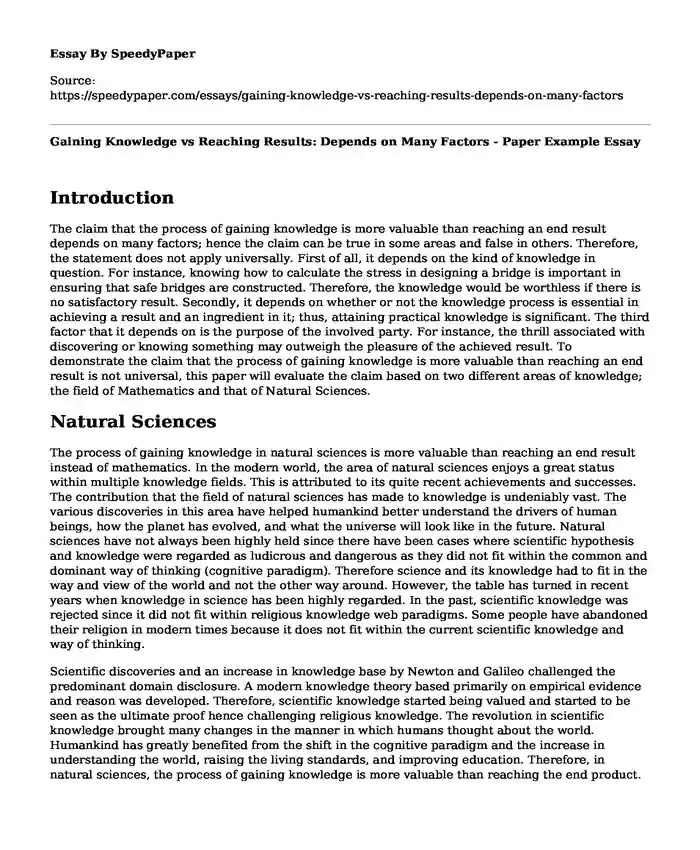
| Type of paper: | Essay |
| Categories: | Education Science Mathematics |
| Pages: | 3 |
| Wordcount: | 822 words |
Introduction
The claim that the process of gaining knowledge is more valuable than reaching an end result depends on many factors; hence the claim can be true in some areas and false in others. Therefore, the statement does not apply universally. First of all, it depends on the kind of knowledge in question. For instance, knowing how to calculate the stress in designing a bridge is important in ensuring that safe bridges are constructed. Therefore, the knowledge would be worthless if there is no satisfactory result. Secondly, it depends on whether or not the knowledge process is essential in achieving a result and an ingredient in it; thus, attaining practical knowledge is significant. The third factor that it depends on is the purpose of the involved party. For instance, the thrill associated with discovering or knowing something may outweigh the pleasure of the achieved result. To demonstrate the claim that the process of gaining knowledge is more valuable than reaching an end result is not universal, this paper will evaluate the claim based on two different areas of knowledge; the field of Mathematics and that of Natural Sciences.
Natural Sciences
The process of gaining knowledge in natural sciences is more valuable than reaching an end result instead of mathematics. In the modern world, the area of natural sciences enjoys a great status within multiple knowledge fields. This is attributed to its quite recent achievements and successes. The contribution that the field of natural sciences has made to knowledge is undeniably vast. The various discoveries in this area have helped humankind better understand the drivers of human beings, how the planet has evolved, and what the universe will look like in the future. Natural sciences have not always been highly held since there have been cases where scientific hypothesis and knowledge were regarded as ludicrous and dangerous as they did not fit within the common and dominant way of thinking (cognitive paradigm). Therefore science and its knowledge had to fit in the way and view of the world and not the other way around. However, the table has turned in recent years when knowledge in science has been highly regarded. In the past, scientific knowledge was rejected since it did not fit within religious knowledge web paradigms. Some people have abandoned their religion in modern times because it does not fit within the current scientific knowledge and way of thinking.
Scientific discoveries and an increase in knowledge base by Newton and Galileo challenged the predominant domain disclosure. A modern knowledge theory based primarily on empirical evidence and reason was developed. Therefore, scientific knowledge started being valued and started to be seen as the ultimate proof hence challenging religious knowledge. The revolution in scientific knowledge brought many changes in the manner in which humans thought about the world. Humankind has greatly benefited from the shift in the cognitive paradigm and the increase in understanding the world, raising the living standards, and improving education. Therefore, in natural sciences, the process of gaining knowledge is more valuable than reaching the end product.
Mathematics
As opposed to natural sciences, the process of gaining knowledge in mathematics is less valuable than reaching an end result. In mathematics, the end product is the most important element and not the knowledge. Mathematics aims to solve a problem by reaching a correct end product that can be utilized for good intentions that benefit humankind. Mathematicians understand mathematics's role in solving problems and coming up with a desirable solution, which is the central aim of their discipline. Without a problem and expected results in the form of a mathematical solution would mean no mathematics or the whole concept is a hoax. Solutions that are end results of a mathematical problem-solving process have played a central role in the thinking and actions of those involved in mathematical concepts. Being able to come up with the correct solution (end result) in mathematics shows that the individual has solved a problem. The importance of the problem-solving capacity in mathematics is from the belief that mathematics is chiefly about reasoning to come up with solutions and not to memorize that entails accumulating a large amount of knowledge.
The proper problem-solving capacity allows the involved party to determine the appropriate procedure to utilize to arrive at the desired end result instead of remembering and applying mathematical knowledge. Coming up with the desired solutions to mathematical problems (end results) shows that an individual has the necessary capacity to think creatively, logically, and critically. In mathematics, the correct end result that entails solutions to problems shows that a person can structure and organize thoughts and process information instead of remembering some memorized knowledge. The skill to solve mathematical problems and reach the desired end result is highly valued in mathematics. It helps mathematicians investigate and understand concepts that are needed in solving real-life problems. Therefore, in mathematics, the end result is more valuable than the process of gaining knowledge.
Cite this page
Gaining Knowledge vs Reaching Results: Depends on Many Factors - Paper Example. (2023, Nov 29). Retrieved from https://speedypaper.net/essays/gaining-knowledge-vs-reaching-results-depends-on-many-factors
Request Removal
If you are the original author of this essay and no longer wish to have it published on the SpeedyPaper website, please click below to request its removal:
- Free Essay with Text Analysis on Technology Impact on Learning
- Chemistry Essay Example about Melting Points
- My Path to Advanced Practice - Personal Statement Essay Example
- Essay Sample on Critical Analysis and Evaluation of Text
- Essay Sample on Western University Of Graduate Nursing
- Essay Sample on Writing Feedback and Student Self-Efficacy
- Learn English: The Key to Success in Modern Life - Essay Sample
Popular categories




